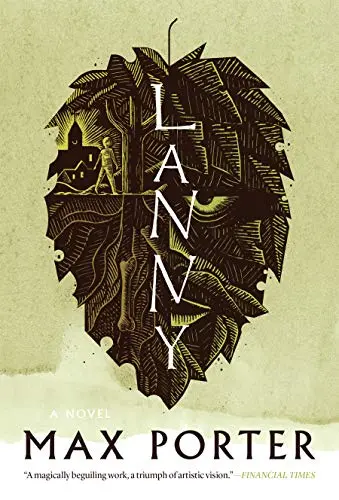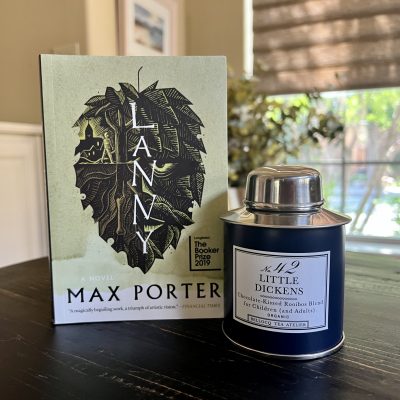
August’s “Tea and a Book” offers Lanny by Max Porter, published in 2020 and long listed for the Booker Prize. This is a strange book with an experimental narrative style, but it swept me up so completely that I finished it in a day.
(See more professional accolades here.)
There’s a village an hour from London. It’s no different from many others today: one pub, one church, redbrick cottages, some public housing, and a few larger houses dotted about. Voices rise up, as they might anywhere, speaking of loving and needing and working and dying and walking the dogs. This village belongs to the people who live in it, to the land and to the land’s past.
It also belongs to Dead Papa Toothwort, a mythical figure local schoolchildren used to draw as green and leafy, choked by tendrils growing out of his mouth, who awakens after a glorious nap. He is listening to this twenty-first-century village, to its symphony of talk: drunken confessions, gossip traded on the street corner, fretful conversations in living rooms. He is listening, intently, for a mischievous, ethereal boy whose parents have recently made the village their home. Lanny.
An intriguing exchange between Lanny and his mother:
Do you believe in heaven?
I do, sort of. Yes.
I agree with Pete.
Oh yeah, what does Pete think happens?
He thinks our souls split off and wander around for a bit, seeing things properly. He thinks we see for the first time how things really work, how close we are to plants, how everything is connected, and we get it, finally, but only for a second. We see shapes and patterns and it’s incredibly beautiful like the best art ever, with maths and science and music and feelings all at once, the whole of everything. And then we just dissolve and become air.
That’s very nice. I’m pleased with that as a thing to look forward to.
Me too. (pp 87-88)
My thoughts:
The format of this story was challenging, and the fact that it starts with Dead Papa Toothwort nearly put me off entirely. Soon enough I adapted to the prose style, but I was never fully comfortable with this book. I think this discomfort actually enriched my reading experience. It also means I will read it again someday soon. (Note: I usually prefer to read on my kindle, but the format of Lanny worked best for me when reading the actual book. There is an audio version, as well)
At the core of this story is a love triangle, though not a romantic one. There’s Lanny, the bright and beautifully odd child with artistic yearnings, who is happily out of sync with the rest of the world. He takes lessons from Pete, a successful artist who has withdrawn from the spotlight and delights in Lanny’s enthusiasm and natural talent. And finally there’s Lanny’s mother, who loves her child fiercely and fights to protect him from those who find him odd and somehow threatening.
Note: there’s a brief scene of physical horror involving a small animal. It could be disturbing for sensitive readers, but it has an important function in the story. I won’t spoil you any further!
Green Man / Green Knight
We learn, over the course of the novel, that Dead Papa Toothwort is a creature akin to the Green Man, only more modern and composed of garbage rather than leaves. To me, this element situates the book firmly in the category of Folk Horror. (See more about the Green Man in my post Green Man / Green Knight, which I wrote after viewing the 2021 film Green Knight starring Dev Patel.)
Now for tea:
The tea pairing that came to mind after reading this book was “Little Dickens” from Belloqc — “A chocolate-kissed blend that is loved by all, this caffeine-free tisane is blended from organic, fair trade South African rooibos, vanilla, cacao nibs, ginger, soothing mint, and cinnamon. This treat calms jitters, settles tummies, soothes the soul, and does so especially well when served with milk and honey. Our favorite hot cocoa alternative is the perfect tea party tipple for young and old alike.” It was easy to imagine Lanny enjoying the chocolatey goodness of this tea.




